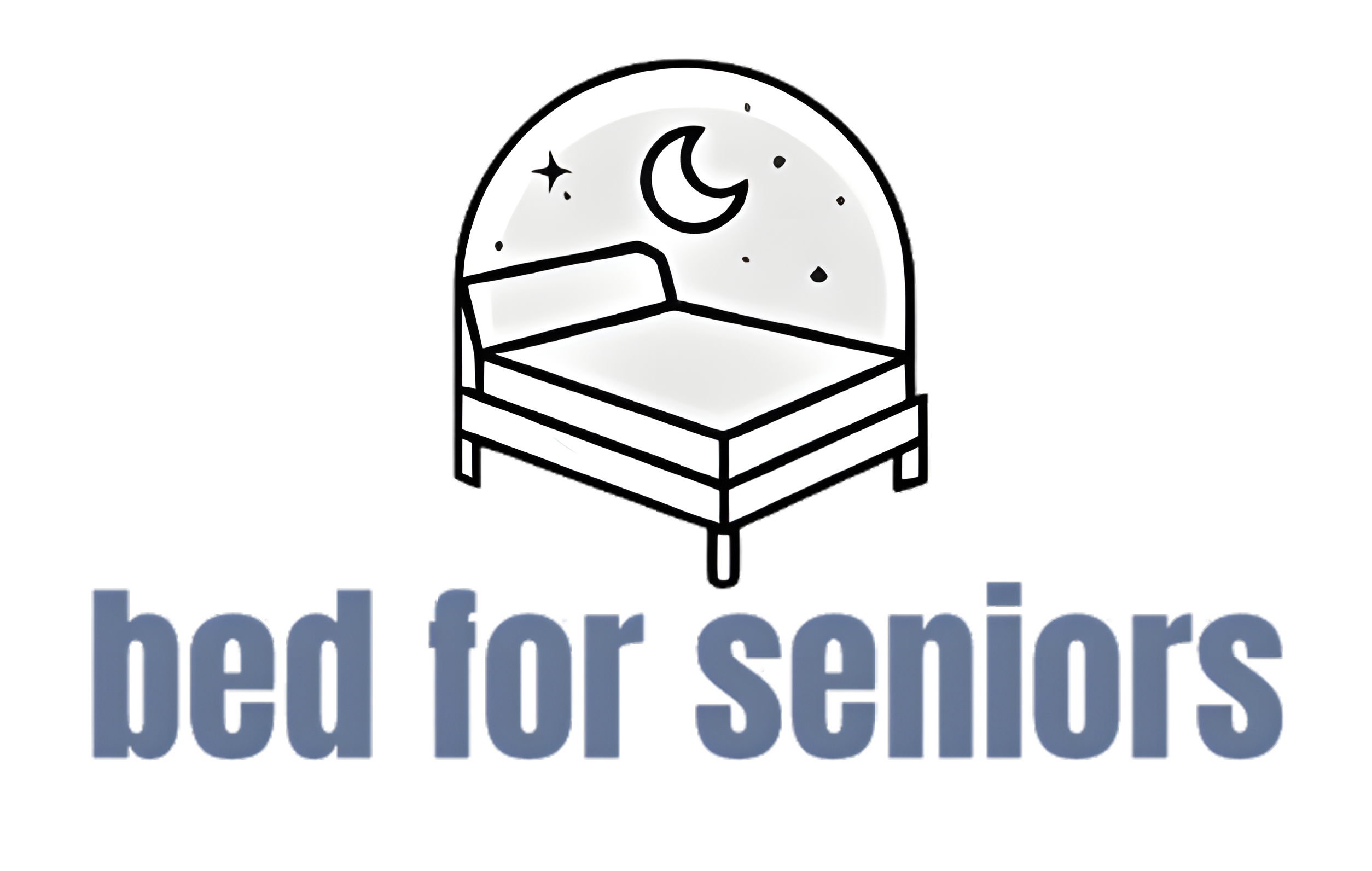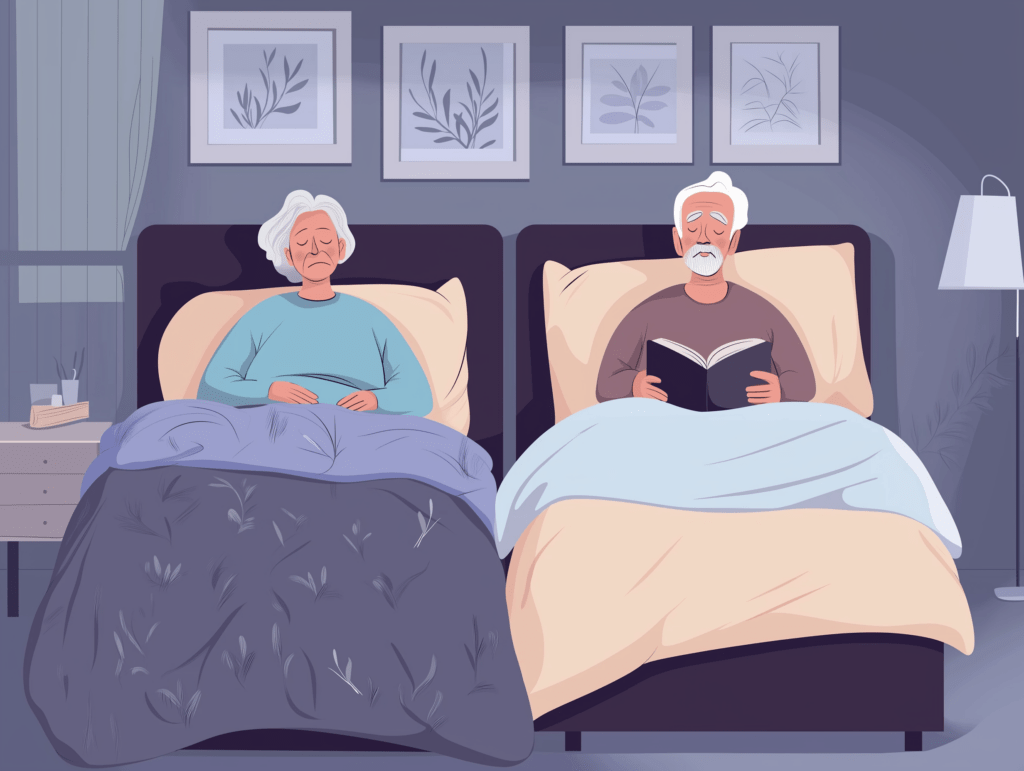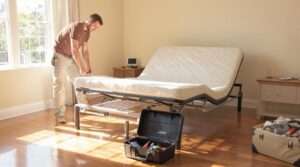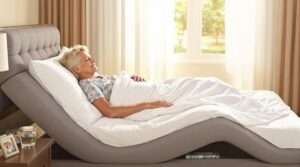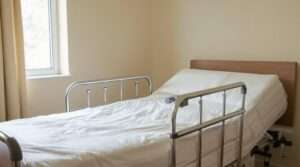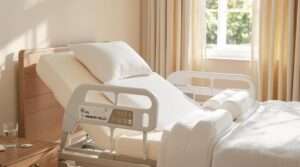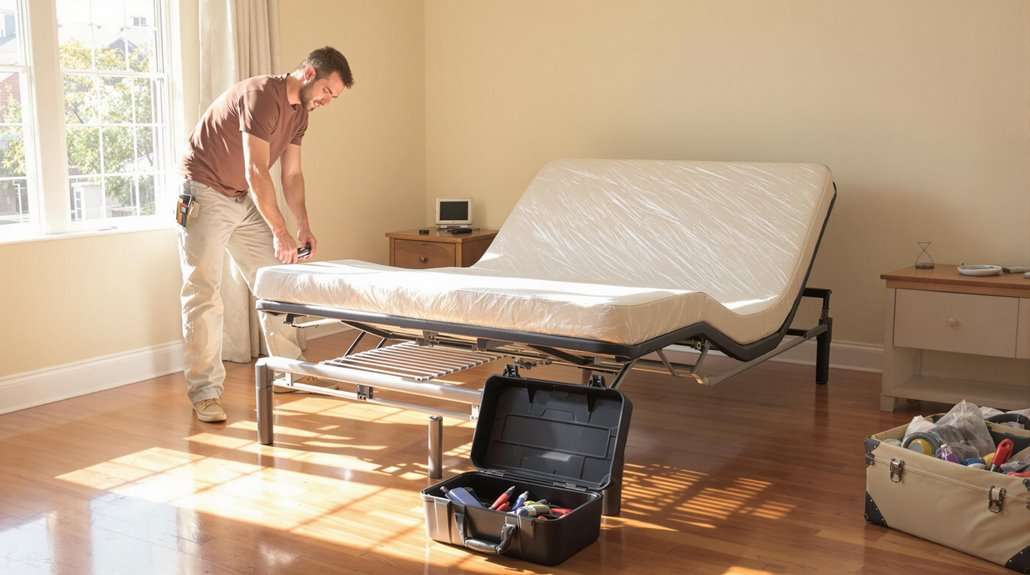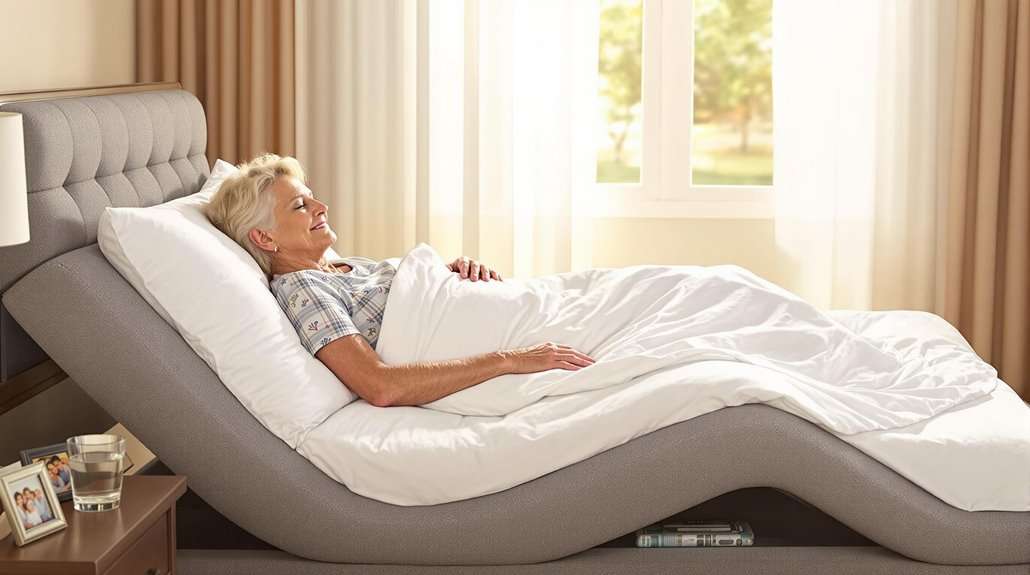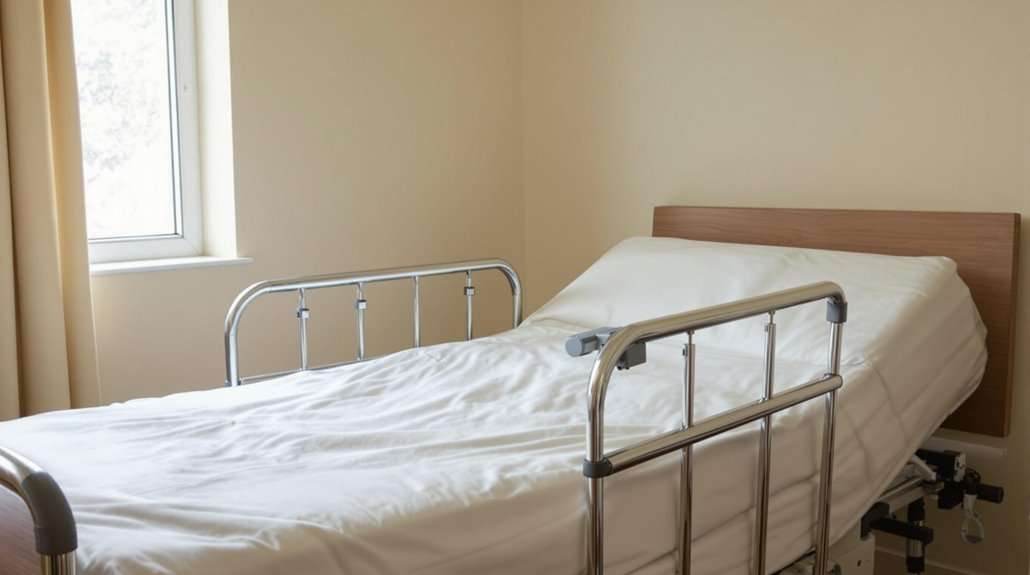As you age, common sleep issues like insomnia, restless leg syndrome, and sleep apnea can disrupt your rest, leaving you fatigued and irritable. Creating a calm sleep environment is essential. Adjustable beds can enhance your comfort, allowing you to find the best position for rest and reducing issues like acid reflux. Specialty mattresses and pillows also offer support while accommodating your unique needs. By focusing on sleep hygiene, such as consistent routines and minimal screen time, you can improve your sleep quality markedly. Discovering the right solutions can transform your nights into peaceful experiences waiting to be explored.
Quick Info
- Insomnia, RLS, and sleep apnea are common sleep issues in elderly individuals that can significantly impact daily life and well-being.
- Establishing good sleep hygiene, including consistent routines and a calming environment, can improve sleep quality for seniors.
- Adjustable beds and specialty mattresses enhance comfort by addressing specific health concerns and promoting better sleep positions.
- Utilizing specialty pillows can provide necessary neck and head support, reducing discomfort and improving overall sleep quality.
- Discussing sleep issues with healthcare providers can lead to tailored solutions and effective management strategies for common sleep problems.
Insomnia in Elderly Individuals
Insomnia often plagues elderly individuals, leading to frustration and fatigue that can impact their daily lives. You might notice that good sleep hygiene plays an important role in improving sleep quality. Ensuring a consistent bedtime routine, minimizing screen time before bed, and creating a comfortable sleeping environment can greatly help.
Cognitive decline is another concern linked to poor sleep. When you don’t get enough rest, your cognitive functions can deteriorate even faster, affecting memory and decision-making skills. It’s important to recognize that sleep isn’t just a luxury; it’s crucial for mental and physical health as we age.
Encouraging activities that promote relaxation, such as gentle yoga or reading, can be beneficial too. Consider incorporating these practices into your daily routine or suggesting them to someone you care for. Additionally, discussing any sleep issues with a healthcare provider can lead to tailored solutions that address underlying causes.
Ultimately, prioritizing sleep hygiene not only enhances sleep quality but also supports cognitive health, allowing elderly individuals to engage more fully in their daily lives. By taking these steps, you can make a considerable difference in the lives of those impacted by insomnia.
Restless Leg Syndrome
Have you ever experienced an overwhelming urge to move your legs, especially when you’re trying to relax or sleep? If so, you might be dealing with Restless Leg Syndrome (RLS). This condition often causes intense discomfort in your legs, leading to an irresistible need to shift them, particularly during the nighttime hours.
RLS can considerably disrupt your sleep, making you feel tired and irritable during the day. You might find that the discomfort intensifies when you’re at rest, which complicates your ability to unwind. It’s essential to recognize that you’re not alone in this struggle—many others share similar experiences.
To alleviate the symptoms of restless legs, consider adopting a few strategies. Regular physical activity can help reduce nighttime discomfort, as can practices like stretching or relaxation techniques. Additionally, evaluating your diet for caffeine or alcohol consumption may prove beneficial, as these can exacerbate RLS symptoms.
Creating a calming bedtime routine may also help. By addressing restless legs with empathy and understanding, you can improve your sleep quality and overall well-being. Remember, seeking advice from a healthcare professional can provide additional support tailored to your specific needs.
Sleep Apnea Symptoms
Sleep apnea affects millions of people, particularly among the elderly, and recognizing its symptoms is vital for effective management. You might notice loud snoring, gasping, or choking during sleep, which can disrupt both your rest and that of your partner. It’s important to pay attention to these signs, as they can indicate that your body’s oxygen levels are dropping during the night.
Other symptoms include excessive daytime sleepiness, irritability, or difficulty concentrating. If you find yourself feeling unusually tired despite a full night’s sleep, it may signal a deeper issue. Identifying these symptoms early can lead to timely interventions, such as discussing snoring solutions with your healthcare provider.
Oxygen therapy might be recommended to help guarantee that you receive adequate oxygen during sleep, improving overall health and quality of life. If you suspect you or a loved one may be suffering from sleep apnea, seek professional advice. By addressing these symptoms proactively, you can make meaningful changes that enhance sleep quality and overall well-being while supporting those you care for. Remember, understanding the signs is the first step toward better health.
Frequent Nighttime Awakenings
Frequent nighttime awakenings can be a frustrating experience for many elderly individuals, disrupting the natural rhythm of rest and recovery. These interruptions can stem from various factors, including anxiety, medical conditions, or even poor sleep hygiene practices. You might notice that your loved ones struggle to stay asleep, leading to fatigue and irritability during the day.
To help mitigate these awakenings, establishing effective nighttime routines becomes essential. Encourage your elderly family members to develop a calming pre-sleep ritual, such as reading, gentle stretching, or listening to soothing music. These activities signal the body that it’s time to wind down, promoting a smoother shift to sleep.
Additionally, maintaining a comfortable sleep environment can greatly impact their ability to stay asleep. Confirm the bedroom is cool, quiet, and dark, and consider investing in a supportive mattress and pillows tailored to their needs.
Lastly, discussing any underlying health issues with a healthcare provider can also provide insight and potential solutions. By prioritizing sleep hygiene practices and fostering supportive nighttime routines, you can help your loved ones achieve more restful nights and rejuvenated mornings.
Impact of Chronic Pain
Chronic pain greatly impacts the quality of sleep for many elderly individuals, often leading to a cycle of discomfort and fatigue. When you’re dealing with persistent pain, it’s tough to find a comfortable position, let alone drift off into a restful sleep. This ongoing issue can not only affect your nights but also your days, as chronic pain often results in increased irritability and decreased energy levels.
Effective chronic pain management is essential for improving sleep quality. Implementing pain relief strategies, like gentle stretching, warm baths, or using heat pads, can make a significant difference. Additionally, establishing a consistent bedtime routine may help signal your body that it’s time to relax. You might also consider discussing medication options with a healthcare provider, as some may better address your pain without disrupting your sleep cycle.
Furthermore, mindfulness and relaxation techniques can be beneficial. These methods can help you cope with the emotional aspects of chronic pain, making it easier to unwind at night. By prioritizing pain relief, you can break the cycle of discomfort and fatigue, ultimately enhancing your overall quality of life.
Importance of Sleep Environment
While many factors contribute to restful nights, the sleep environment plays an essential role in determining sleep quality for elderly individuals. Creating a calming atmosphere can greatly improve sleep, helping to alleviate issues that often accompany aging.
To optimize the sleep environment, consider the following elements:
- Ambient Lighting: Soft, adjustable lighting promotes relaxation and signals the body to wind down.
- Noise Reduction: Minimizing disruptive sounds, whether through soundproofing or using white noise machines, can help maintain a peaceful sleep setting.
- Comfortable Bedding: High-quality, supportive mattresses and pillows cater to individual preferences and can enhance comfort.
- Temperature Control: Maintaining a cool and comfortable room temperature is vital, as it can influence sleep patterns.
Adjustable Beds for Comfort
Many people find that adjustable beds can greatly enhance their sleep experience, particularly for elderly individuals dealing with discomfort or health issues. These beds allow users to customize their sleep position, which can alleviate pressure on sensitive areas and improve overall comfort. By elevating the head or feet, you can find a position that reduces pain and promotes better circulation, ultimately leading to a more restful night.
For those facing challenges with bed mobility, adjustable beds can be a game-changer. They make it easier to get in and out of bed, reducing the risk of falls and injuries. This added convenience can considerably boost confidence and independence, allowing elderly individuals to manage their sleep environment more effectively.
Additionally, the ability to change your sleep position can help with common issues like acid reflux or sleep apnea. By adjusting the bed to a more suitable angle, you can create a more conducive environment for restful sleep. In this way, adjustable beds not only enhance comfort but also cater to specific health needs, ensuring that sleep is both restorative and safe.
Specialty Mattresses and Pillows
Elderly individuals often experience unique sleep challenges that can considerably impact their overall well-being. Selecting the right specialty mattresses and pillows can play an essential role in enhancing their sleep quality.
Memory foam mattresses are particularly beneficial for seniors, as they offer excellent support and contour to the body’s shape, alleviating pressure points. Additionally, many memory foam products now incorporate cooling technology, which helps regulate temperature and combats night sweats, a common concern among the elderly.
When considering specialty mattresses and pillows, keep these factors in mind:
- Support: Look for mattresses that provide adequate support for joints and spine alignment.
- Cooling Features: Choose products with cooling technology to enhance comfort and reduce overheating.
- Easy Maintenance: Opt for hypoallergenic materials that are easy to clean and maintain.
- Durability: Invest in high-quality materials that will withstand wear over time.
Frequently Asked Questions
How Does Aging Affect Sleep Cycle Patterns?
As you age, your sleep cycle’s shifting structures can surprise you. Sleep architecture changes, leading to lighter slumbers and reduced REM sleep. Your circadian rhythms may also wobble, causing earlier bedtimes and wake-up calls. These alterations can affect your energy and mood, making it essential to understand how aging impacts your rest. By recognizing these patterns, you can better support yourself or loved ones in achieving more restful nights and rejuvenated days.
Are There Dietary Changes to Improve Sleep Quality?
To improve your sleep quality, consider making some dietary changes. You might find that sipping herbal teas, like chamomile or valerian root, helps relax your mind before bed. Additionally, incorporating sleep supplements, such as melatonin, could enhance your ability to fall asleep. It’s crucial to avoid heavy meals close to bedtime, as they can disrupt your sleep. By making these adjustments, you can create a more restful and rejuvenating nighttime routine.
What Role Does Exercise Play in Sleep Improvement?
You might think you’re too tired to exercise, but incorporating physical activity can actually enhance your sleep quality. Regular exercise improves your sleep environment by reducing anxiety and promoting relaxation. It helps regulate your sleep patterns, making it easier to fall asleep and stay asleep. Even light activities like walking can make a difference. By prioritizing exercise, you’re not just benefiting yourself; you’re also creating a more restful atmosphere for those around you.
How Can Family Members Support Elderly Sleep Health?
To support an elderly family member’s sleep health, focus on creating a calming sleep environment. Make certain their bedroom is dark, quiet, and cool. Offer emotional support by actively listening to their concerns about sleep and providing reassurance. Encourage healthy sleep habits, like maintaining a consistent bedtime. Engaging in light evening activities together can also promote relaxation. Your presence and understanding can make a significant difference in their overall sleep quality and well-being.
What Are Some Calming Bedtime Routines for Seniors?
Imagine ending your day like a tranquil scene from a classic film. You can create calming bedtime routines by incorporating mindfulness meditation and relaxation techniques. Start by dimming the lights and playing soft music. Engage in gentle stretching or deep breathing exercises to release tension. Reading a favorite book or sipping herbal tea can also promote serenity. These thoughtful practices not only enhance sleep quality but also foster a deep sense of peace and well-being.
